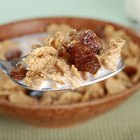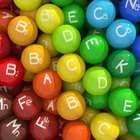
PicLeidenschaft/iStock/Getty Images
Swiss cheese is distinguished from other cheeses by its characteristic holes. These holes are formed from carbon dioxide gas produced by the bacterial starter culture that's added to milk to make this cheese. Swiss cheese has a nutty, sweet flavor and is often paired with fruit or deli meat or used as a condiment. Nutritional values are based on a 1 oz. serving of Swiss cheese.
Basic Nutrition
An ounce of Swiss cheese contains 106 calories, 1.5 g of total carbohydrates and 0 g of dietary fiber. Based on a 2,000 calorie-a-day diet, these measurements represent 1 percent of the recommended daily value, or DV, for carbohydrates and 0 percent for dietary fiber. Swiss cheese provides 7.5 g, or 15 percent DV, of protein.
Fats
The total fat content is 7.8 g, which represents a large 12 percent of the recommended daily value. One serving provides 5 g of saturated fat, 2 g of monounsaturated fats and 0.3 g of polyunsaturated fats. Heart-healthy fatty acids in one ounce include 98.5 mg of omega-3 and 174 mg of omega-6.
Vitamins
Swiss cheese contains 0.9 mcg of vitamin B12, or 16 percent DV; 0.1mg of riboflavin, or 5 percent DV; 232 IU of vitamin A, or 5 percent DV; and 12.3 IU of vitamin D, or 3 percent DV. Vitamins in 1 oz. of Swiss cheese with 1 percent DV each include vitamin E, vitamin K, thiamin, vitamin B6 and panthothenic acid.
Minerals
Swiss cheese is a rich source of calcium, with 221.5 mg, or 22 percent DV, per ounce. Other minerals include phosphorus, with 159 mg, or 16 percent DV; zinc, with 1.2 mg, or 8 percent DV; selenium, with 5.1 mcg, or 7 percent DV; and magnesium, with 10.6 mg, or 3 percent DV. The same amount of Swiss cheese provides 1 percent DV of the minerals potassium and copper.
Sodium
Swiss cheese contains 53.8 mg of sodium, representing 2 percent DV. This is substantially lower than the sodium content of many other cheeses. Swiss cheese contains 26 mg of cholesterol, or 9 percent DV.
Related Articles

Cappuccino Nutrition Information

How Many Calories Are in a Slice of ...

Calories in One Slice Provolone Cheese

How to Get a Certified Copy of Your ...

How to Get a Replacement Birth ...

Calories in a Bowl of Raisin Bran Cereal

How to Replace a Nike Triax 50 Battery

How to Address an Envelope With ...

Nutrition Information on Blueberries

Does It Take Longer to Cook With the ...

How Many Calories Are in Butternut ...

How to Take Out Scratches From Silver ...

How to Clean Palladium Jewelry

How to Make Toasted Bread Sticks With ...

How to Freeze Lentils

What Vitamins Help the Liver?

Provolone Cheese Nutrition Information

How Much Is a Single Serving Size of a ...

How Many Calories in a Cheese Scone?

How to Change the Battery in a Luminox ...
References
Writer Bio
Lindsay Tadlock began writing in 2010. She has worked as a personal trainer for over three years and shares her fitness and nutrition knowledge in her writings. She graduated from Texas A&M University in 2000 with her Bachelor of Arts in finance and worked for seven years as a commercial lender.
Photo Credits
PicLeidenschaft/iStock/Getty Images